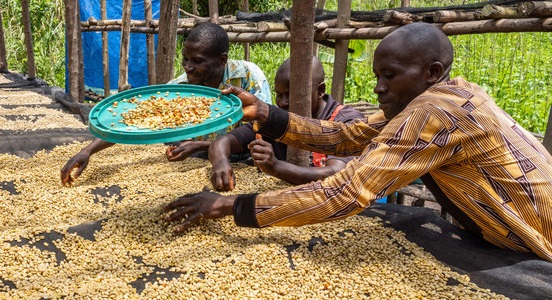
Farm Africa is working in North Kivu in DR Congo to boost coffee production and link growers to international markets.
Farmers in eastern DR Congo work in extremely difficult circumstances. Continuing armed conflict makes the area highly insecure.
Climate change and human activity in Virunga National Park threaten the ecosystem on which many communities depend. COVID-19 exacerbated pre-existing problems, making it even more challenging for farmers to grow and export coffee.
Despite these challenges, farmers in North Kivu are now producing some of eastern Africa’s finest Arabica coffee.
In partnership with Virunga National Park and with funding from the European Union, Farm Africa is supporting coffee growers living on the borders of the Park to increase the quality and quantity of their coffee, obtain certifications and access international markets.
Farm Africa partnered with two cooperatives, Coopade and Kawa Kanzururu. Combined, these two cooperatives have 6,366 members and process their coffee in 40 micro washing stations across North Kivu.
The washing stations provide high quality processing of the coffee cherries close to the cooperative members’ farms and are key in ensuring the overall quality of the final coffee beans. This infrastructure has improved and extended over the course of the project.
Coffees we’ve tasted from the Virunga National Park project in North Kivu have impressed us greatly, to say the least. Not only do they have the potential to stand with the best Arabicas produced in the DRC, but also some of the best produced in East Africa.
Kyle Tush, Counter Culture Coffee.
PRODUCING QUALITY COFFEE AND OBTAINING SUSTAINABILITY CERTIFICATIONS
Farm Africa works with the cooperatives to refine each step of the coffee production process, increasing both the quality and quantity of the coffee produced. We train the farmers in good agricultural practices, harvesting and processing techniques.
Two coffee quality labs were built with support from an ÉLAN project and coffee cuppers were trained. This is enabling farmers for the first time to understand and evaluate their own coffees, and to better understand buyers’ requirements.
Over the course of the project, 68,500 coffee seedlings have been distributed to farmers at Coopade and Kawa Kanzururu cooperatives, accompanied by training in planting and nurturing. A visual manual on good agricultural practices has been developed, specifically geared to the growing conditions and farming calendar of North Kivu.
This year Farm Africa supported the two cooperatives to become FLO Fairtrade certified to add to their organic certification. As well as attracting certification premiums, these certifications are very important for market access.

ACCESS TO FINANCE AND LINKS TO MARKETS
Farm Africa is supporting the cooperatives with business planning, financial reviews and gaining access to working capital. Two international ethical lenders and a local bank are now providing crop finance.
We trained the cooperatives in contract negotiation and worked with them to promote their coffees in international markets, where coffee from DR Congo is still relatively unknown.
As a result of Farm Africa’s work to identify buyers and support the building of commercial partnerships, the cooperatives are now selling their coffee for premium prices in countries including Japan, Germany, France, Belgium, the USA and the UK.
With Farm Africa’s support, 404.4 tonnes of coffee were exported in the 2020- 2021 season, valued at $1.35 million. After making losses in 2018-2019, each cooperative has operated profitably in each subsequent year, paying back their harvest finance borrowings in full.
Farmers taking part in the project exported 404.4 tonnes of coffee in 2020-2021, valued at $1.35 million.
INCENTIVISING SUSTAINABILITY
Lack of market channels and technical assistance over many years meant that farmers neglected coffee as a potential source of income. Unsupported, low-income farmers were often left with few options to earn a livelihood.
This led to pressure to encroach on Virunga National Park, for instance by cutting down trees for charcoal production. Such activities damage the biodiversity of the precious landscape, including the habitat of endangered mountain gorillas.
The project addressed these problems by introducing sustainable farming practices and renewing the coffee trees, thereby incentivising a sustainable method of farming.
SUPPORTING WOMEN
Women play key roles in the success of the two coffee cooperatives. Women’s associations run several of the cooperatives’ coffee washing stations.
For the first time, it is now possible to buy coffees grown and processed by female coffee farmers in North Kivu.
